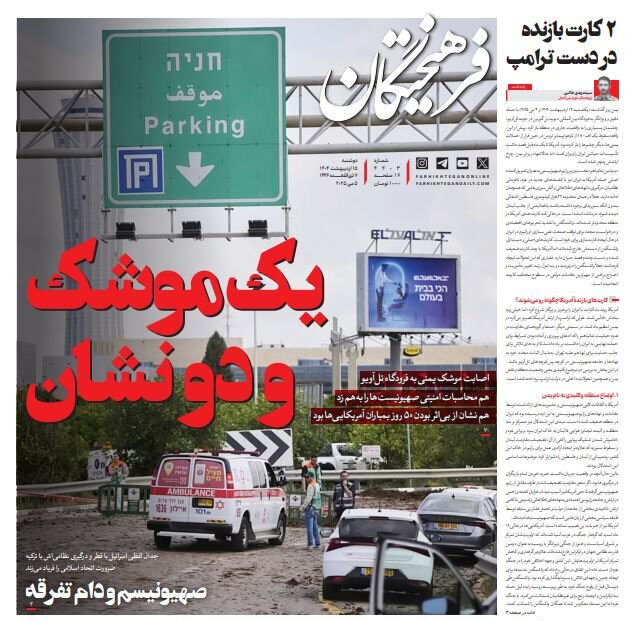Ambiguity in the negotiations; neither failure nor agreement

TEHRAN - Farhikhtegan analyzed the ambiguity surrounding the negotiations between Iran and the United States and said: The indirect negotiations between Iran and the United States are now in a state of ambiguity; they cannot be considered a failure, nor have they reached a tangible result.
Recent developments in the White House have marginalized optimistic predictions of an imminent agreement and show that Washington is not only not seeking an early lifting of sanctions, but is also pushing the negotiations toward a more complicated direction by raising non-nuclear issues, such as accusations against Iran about regional development. Meanwhile, the enthusiasm of some domestic analysts about the possibility of an agreement could lead to unrealistic expectations by the public and weaken the position of the Iranian negotiating team against the American side. The statements of Seyyed Abbas Araghchi after the third round of talks in Oman, which emphasized Iran’s cautious approach, as well as the statement of the Foreign Ministry, which was written after the imposition of a new round of sanctions regarding “suspicion about America’s seriousness,” are a warning against this premature optimism. This situation shows that the talks are shrouded in ambiguity, and any definitive assessment, whether optimistic or pessimistic, requires greater precision.
Etemad: JCPOA talks faced less hurdles
In a note, Etemad discussed the change in the current condition of the nuclear talks compared to the negotiations that led to the JCPOA in 2015. The newspaper said: It should be noted that the current situation of Iran, the United States, the region, and the world has completely changed compared to the time of the negotiations and the JCPOA agreement. In the region, apart from Israel, no other enemy for Iran and the agreement can be imagined. Competitions of this kind cause most of the prominent countries surrounding Iran neither want to increase Iran’s tension with others, especially the United States, nor favor a comprehensive solution to the foreign policy issues of the Islamic Republic of Iran. The current America is different from the America of the Obama era, Europe is in a weakened position, and Israel is equally or more anti-Iran. Also, limiting Trump's authority to effectively lift sanctions, increasing non-nuclear sanctions, and the imminent snapback are some of the topics ahead. Therefore, we cannot expect a sudden opening. Perhaps it would be better for Iran itself to craft a set of proposals so that the initiative does not fall into the hands of American or Israeli think tanks and institutes to contain Iran or sabotage the negotiations.
Vatan-e-Emrooz: Chabahar is a strategic port
Vatan-e-Emrooz examined the importance of Chabahar Port and wrote: Chabahar Port has a special place in Iran's economic and trade strategies. The importance of this port is evident not only domestically but also regionally and internationally. It has a high capacity to become an international transit and trade hub. Chabahar Port, as an important trade gateway, can play a key role in international corridors. The port is considered a center for the transit of goods between Central Asian and South Asian countries and can turn Iran into one of the main regional trade routes. Trilateral agreements between Iran, India, and Afghanistan indicate the importance of this port in strengthening regional cooperation and attracting foreign investments. Maximum use of Chabahar Port's capacities will not only lead to the development of trade but also will have an impact on the promotion of Iran's political and diplomatic relations with regional countries and other influential players, such as India and Russia. These interactions create an appropriate infrastructure for economic partnerships and sustainable security in the region.
Donya-e-Eqtesad: Achieving a formula on nuclear enrichment is possible
In an interview with Rahman Ghahremanpour, a senior researcher on international affairs, Donya-e-Eqtesad discussed the postponement of negotiations between Iran and the United States. He said: Today, there are two issues; if the United States wants to limit the talks to the nuclear issue, it is not impossible to reach an agreement on Iran’s nuclear enrichment. Some technical solutions can be found that will allow Iran to enrich uranium to 3.67% and give the United States a peace of mind. Of course, we still do not know whether the United States wants to limit the talks to the nuclear issue or raise missile and regional issues as well. If other issues are raised, there is a possibility that the negotiations will end in a deadlock. If both the U.S. and Iran agree to limit the talks to the nuclear issue and not seek a comprehensive agreement, it is possible to find ways to resolve the enrichment issue.
Leave a Comment